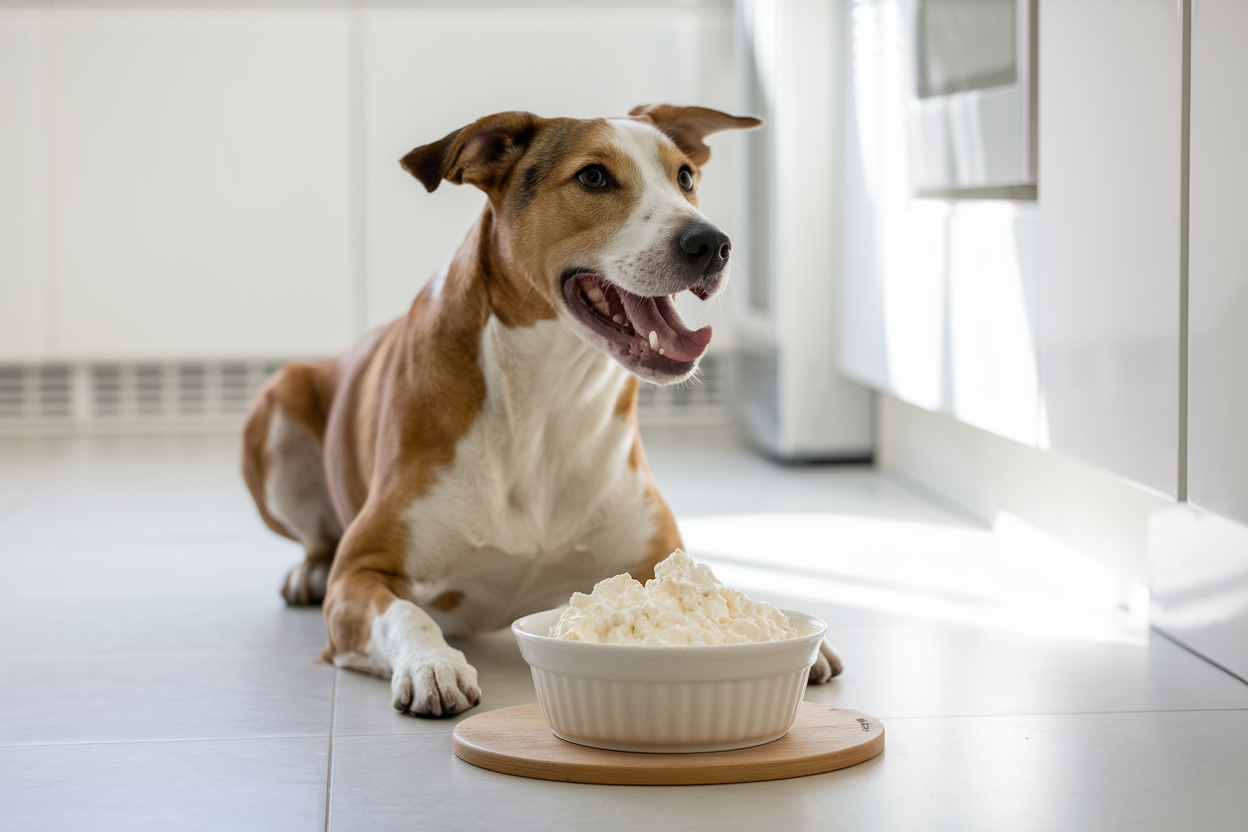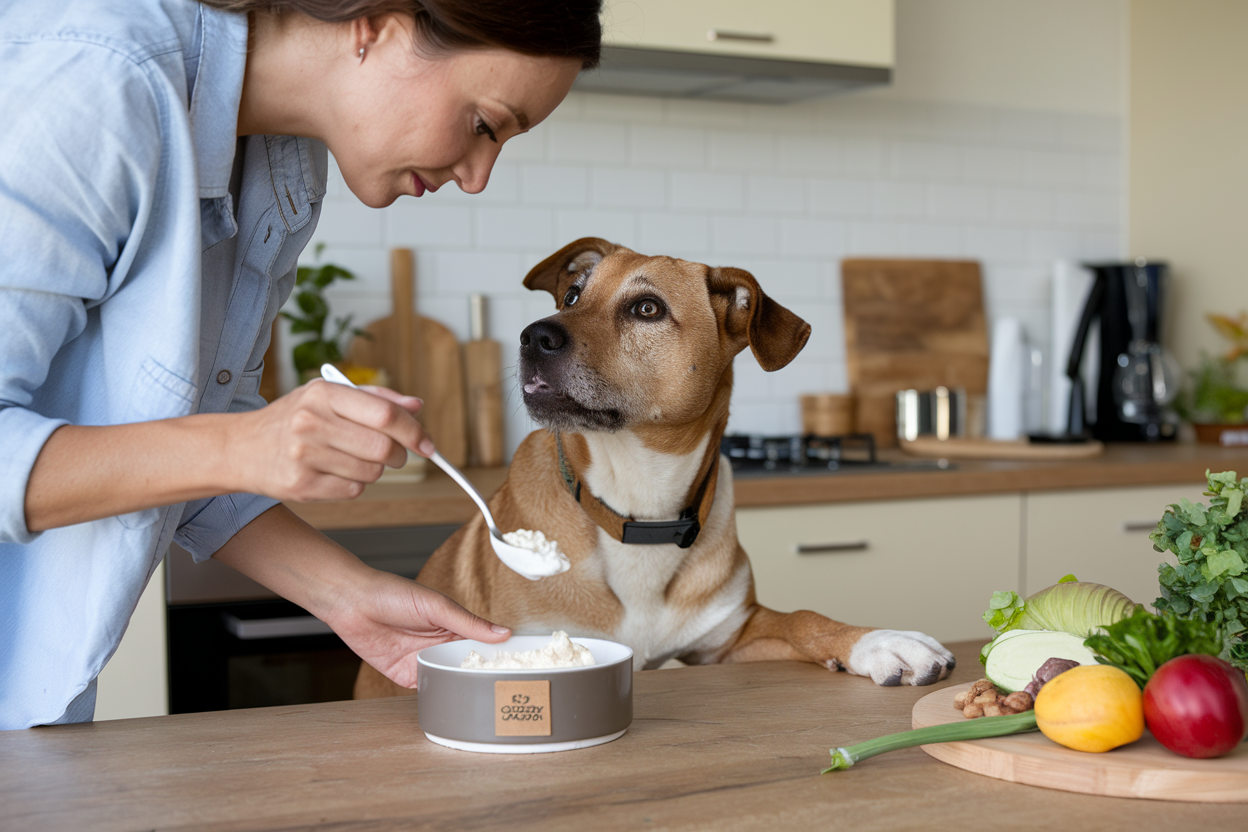As pet owners, we often find ourselves wondering whether certain human foods are safe for our furry friends. Cottage cheese is a staple in many households, known for its mild flavor and creamy texture. But can dogs enjoy this popular dairy product too? In this article, we’ll explore whether dogs can eat cottage cheese, its benefits, risks, and how to safely incorporate it into your dog’s diet.
What is Cottage Cheese?
Cottage cheese is a fresh cheese made from curds, which are formed during the curdling process of milk. It’s a rich source of protein and calcium, often enjoyed as a snack or used in recipes for its mild, slightly tangy flavor. The texture of cottage cheese can vary from creamy to chunky, depending on the size of the curds.
This dairy product is also packed with essential nutrients like B vitamins, phosphorus, and selenium. Its high protein content makes it a popular choice for those looking to build muscle or maintain a healthy diet. But how does it fare when it comes to feeding it to dogs? Before you share your snack with your canine companion, there are some important factors to consider.
For more ideas on how to use cottage cheese, explore these delicious cottage cheese recipes that are perfect for any time of day.
Is Cottage Cheese Safe for Dogs?
The good news is that cottage cheese can be safe for dogs to eat, but it comes with certain considerations. Dogs, like humans, can have varying degrees of lactose intolerance. While cottage cheese contains less lactose than other dairy products like milk, it can still cause digestive issues in some dogs. Lactose intolerance in dogs can lead to symptoms like bloating, gas, and diarrhea.
Despite the potential for lactose intolerance, cottage cheese can be a nutritious addition to a dog’s diet in moderation. It’s packed with protein, which is vital for supporting muscle growth and repair.. Additionally, it contains probiotics that can support digestive health, especially in dogs with sensitive stomachs.
However, it’s important to introduce cottage cheese slowly into your dog’s diet to monitor for any adverse reactions. Start with a small amount and observe how your dog responds before making it a regular part of their diet.
To better understand lactose intolerance in dogs, refer to this resource on lactose intolerance in dogs by VCA Hospitals.
Nutritional Benefits of Cottage Cheese for Dogs
Cottage cheese is a nutrient-dense food that can offer several health benefits to dogs when fed appropriately:
- High in Protein: Protein is crucial for maintaining strong muscles and tissues in dogs. Cottage cheese, being rich in protein, can contribute to your dog’s daily protein needs.
- Calcium and Phosphorus: These minerals are important for maintaining healthy bones and teeth. Cottage cheese provides a good source of both.
- Low in Fat (depending on the variety): Cottage cheese is available in low-fat and fat-free options, making it a suitable treat for dogs that need to manage their weight.
- Probiotics: Some cottage cheeses contain live cultures that can aid in digestion by promoting healthy gut flora.
However, while cottage cheese has many benefits, it’s important to ensure it complements your dog’s overall diet. It should not be the main source of nutrition but rather an occasional treat or supplement.
For more insights into maintaining your dog’s health, consider reading can I freeze cottage cheese, which provides useful information on how to preserve cottage cheese safely.
How Much Cottage Cheese Can Dogs Eat?
The amount of cottage cheese you can feed your dog depends on their size, dietary needs, and how well they tolerate dairy. As a general rule:
- Small Dogs: Can be given 1-2 teaspoons of cottage cheese as a treat or mixed with their regular food.
- Medium Dogs: Can have 1-2 tablespoons of cottage cheese.
- Large Dogs: Can enjoy 2-4 tablespoons, depending on their size and tolerance.
It’s recommended to limit cottage cheese to no more than 10% of your dog’s daily caloric intake. Feeding too much cottage cheese can lead to an imbalance in their diet, causing weight gain or digestive issues.
When introducing cottage cheese into your dog’s diet, start with a small amount and gradually increase it to avoid overwhelming their digestive system. If your dog shows any signs of lactose intolerance, such as diarrhea or vomiting, discontinue feeding cottage cheese immediately.
Can Cottage Cheese Help with Specific Dog Health Issues?
Cottage cheese can be particularly beneficial for dogs with certain health conditions when used appropriately:
- Bland Diet for Digestive Issues: Cottage cheese is often recommended as part of a bland diet for dogs experiencing gastrointestinal distress. It can be mixed with plain, cooked rice to provide a gentle, easy-to-digest meal.
- Protein Source for Dogs Recovering from Illness: If your dog is recovering from surgery or an illness, cottage cheese can be a soft, easily digestible source of protein to help them regain strength.
- Weight Management: For overweight dogs, low-fat cottage cheese can be a satisfying treat that doesn’t add too many extra calories.
However, it’s always best to consult your veterinarian before making any significant changes to your dog’s diet, especially if your dog has existing health conditions.
Risks and Considerations
While cottage cheese can be a healthy treat for many dogs, there are risks and considerations to keep in mind:
- Lactose Intolerance: As mentioned earlier, some dogs cannot tolerate lactose, which can lead to digestive upset. If your dog is lactose intolerant, it’s best to avoid feeding them cottage cheese.
- High Sodium Content: Some cottage cheeses contain added salt, which can be harmful to dogs if consumed in large quantities. Always opt for low-sodium or unsalted varieties.
- Fat Content: Full-fat cottage cheese can contribute to weight gain if fed in excess. If your dog is prone to obesity, choose low-fat or fat-free options.
Additionally, avoid flavored or seasoned cottage cheese as these often contain ingredients that are harmful to dogs, such as onions, garlic, or artificial sweeteners like xylitol.
Alternative Dairy Products for Dogs
If your dog cannot tolerate cottage cheese or if you’re looking for variety, there are other dog-friendly dairy options available:
- Plain Yogurt: Contains probiotics and is often easier for dogs to digest. It can serve as a suitable option for dogs that are lactose intolerant.
- Cheese: In moderation, certain types of cheese like cheddar or mozzarella can be a tasty treat for dogs. Be mindful of the fat content.
- Goat’s Milk: Easier to digest than cow’s milk, goat’s milk can be a good alternative for dogs with sensitive stomachs.
Each of these alternatives has its own benefits and should be fed in moderation. When choosing dairy products, always opt for plain, unsweetened varieties without added flavors or sweeteners.
How to Safely Serve Cottage Cheese to Your Dog
When serving cottage cheese to your dog, it’s important to do so safely to avoid any potential issues:
- Keep It Plain: Always serve plain cottage cheese with no added flavors, salt, or sweeteners.
- Mix with Other Foods: Cottage cheese can be mixed with your dog’s regular food, such as kibble, or served with other dog-friendly foods like cooked vegetables or rice.
- Use as a Treat: Cottage cheese can be used as a high-value treat during training or as an occasional snack.
Avoid giving your dog cottage cheese that has been sitting out for too long or has gone bad, as spoiled dairy products can cause food poisoning.

FAQs: Can Dogs Eat Cottage Cheese?
Can dogs eat cottage cheese if they are lactose intolerant?
Dogs with lactose intolerance should avoid cottage cheese, as even small amounts of lactose can cause digestive upset. Opt for lactose-free alternatives like plain yogurt made from lactose-free milk.
How often can I feed my dog cottage cheese?
Cottage cheese should be fed in moderation, no more than a few times a week, and should make up no more than 10% of your dog’s daily caloric intake.
Is cottage cheese good for dogs with upset stomachs?
Yes, cottage cheese can be part of a bland diet for dogs with upset stomachs. It is gentle on the digestive system and can be mixed with plain rice or boiled chicken.
What types of cottage cheese are best for dogs?
Opt for plain, low-fat, or fat-free cottage cheese with no added salt or flavorings. Avoid any cottage cheese with herbs, spices, or other additives that could be harmful to dogs.
Can puppies eat cottage cheese?
Yes, puppies can eat cottage cheese in small amounts as part of a balanced diet. However, it’s important to ensure that the cottage cheese is plain and that your puppy is not lactose intolerant.
What should I do if my dog reacts badly to cottage cheese?
If your dog shows signs of digestive upset after eating cottage cheese, such as diarrhea or vomiting, discontinue feeding it and consult your veterinarian. Your dog could be lactose intolerant or have a dairy allergy.
Conclusion
Cottage cheese can be a nutritious and enjoyable treat for many dogs when fed in moderation and with consideration to their individual dietary needs. While it offers several benefits, such as being a good source of protein and calcium, it’s important to be mindful of the potential risks, especially for dogs with lactose intolerance or weight management issues.
By introducing cottage cheese slowly into your dog’s diet and monitoring their reaction, you can safely enjoy sharing this dairy product with your canine companion. However, as with any new food, it’s always a good idea to consult with your veterinarian before making it a regular part of your dog’s diet.
For more information on what human foods are safe for dogs, refer to PetMD’s guide on safe human foods for dogs.

